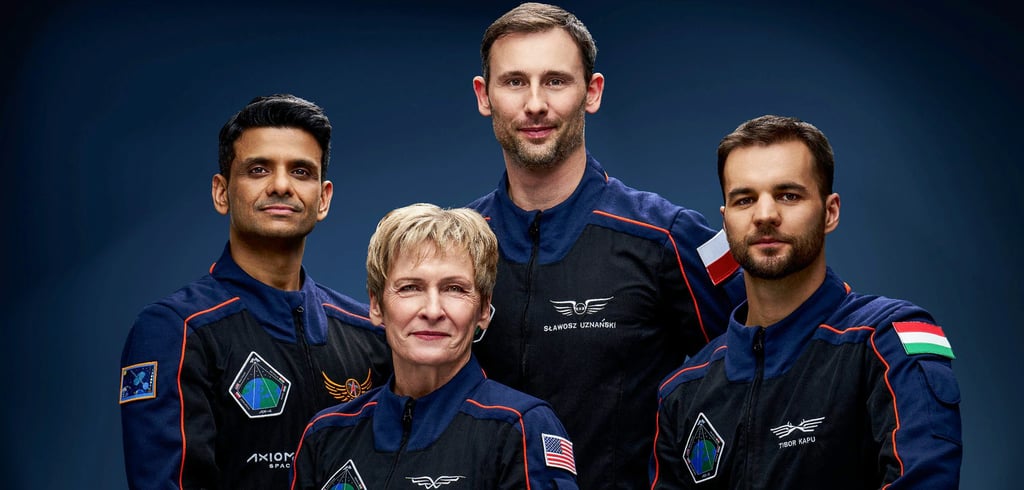Axiom Mission 4 Returns to Earth: A Proud Milestone for Global Spaceflight and India’s Shubhanshu Shukla
On July 15, 2025, a SpaceX Crew Dragon capsule named Grace safely splashed down in the Pacific Ocean near San Diego. It marked the successful end of Axiom Mission 4 (Ax-4), a collaborative spaceflight involving NASA, SpaceX, Axiom Space, and space agencies from India, Poland, and Hungary.
NATIONALTECHNOLOGY
Thinkbrief
7/15/20253 min read


After 18 days aboard the International Space Station (ISS), the mission concluded with all four astronauts returning home safely. Among them was Group Captain Shubhanshu Shukla of the Indian Air Force, whose role as India’s mission pilot captured the imagination of the entire nation.
A Mission of Global Firsts
Ax-4 was unique in many ways. The crew included American astronaut Peggy Whitson, the most experienced U.S. astronaut in history, as well as first-time space travelers from Poland, Hungary, and India. For these countries, it was the first government-backed human space mission in more than 40 years.
The crew launched on June 27 from Kennedy Space Center in Florida aboard a Falcon 9 rocket and docked with the ISS shortly after. Once in orbit, they conducted more than 60 scientific experiments covering fields like space medicine, materials science, agriculture, and biology. Seven of these experiments were led by Indian institutions and supported by ISRO. They studied everything from how microalgae grow in space to how radiation affects the human body. These experiments are expected to provide valuable insights for India’s own human space mission, Gaganyaan, planned for 2027.
Shubhanshu Shukla: India's Quiet Trailblazer
For many Indians, the highlight of Ax-4 was seeing Group Captain Shubhanshu Shukla represent the country in space. Born in Lucknow and trained as a test pilot in the Indian Air Force, Shukla has over 2,000 flight hours on fighter jets like the Su-30MKI and MiG-29. In 2019, he was selected to join India’s astronaut training program. Since then, he has trained in Russia, the U.S., and at SpaceX’s facilities in California.
As the mission pilot for Ax-4, Shukla was in charge of key responsibilities like monitoring Crew Dragon’s systems, handling manual overrides, and assisting with docking and re-entry procedures. But it wasn’t just his technical skill that stood out. His calm demeanor and sharp instincts earned him deep respect from the team. Commander Peggy Whitson described him as “wicked smart” and incredibly focused. Another astronaut joked that Shukla seemed “130 years old in wisdom.”
Shukla also had a deeply human side to his role. In one emotional message from orbit, he said, “Mere kandhe par Tiranga hai… I want all of you to be part of this journey. Jai Hind.” That moment, shared widely on social media, resonated with millions back home.
A Cultural Connection in Space
While science was at the heart of the mission, the astronauts also made time to connect on a personal level. During one special dinner aboard the ISS, Shukla shared Indian food with the crew—serving dishes like aam ras and carrot halwa. It was a small but meaningful gesture, reminding everyone that even far from Earth, culture and tradition still have a place.
He also contributed significantly to scientific work onboard, especially in running experiments tied to India’s future space goals. Data from these projects will help ISRO improve astronaut health monitoring, life support systems, and mission design for Gaganyaan.
A Step Toward Gaganyaan
India invested around ₹550 crore in this mission, and the returns are both practical and symbolic. Shukla’s presence aboard Ax-4 gave ISRO firsthand insights into crewed spaceflight. His experience, especially in navigating real-time challenges, will play a key role in shaping India’s approach to human space travel.
The success of Ax-4 strengthens India’s standing in global space partnerships. It also demonstrates the potential of combining public and private efforts to advance human exploration beyond Earth.
A Nation Watches and Celebrates
Back in Lucknow, Shukla’s family and neighbors gathered to watch the live broadcast of the capsule’s return. With prayers on their lips and pride in their hearts, they celebrated when news of the safe splashdown came in. Across the country, people hailed him as a national hero.
In interviews after landing, Shukla remained humble. “This mission belongs to all Indians,” he said. “I carried the flag, but every heartbeat back home lifted me.”
Looking Ahead
Shukla and the rest of the crew will now spend a few days in medical recovery before returning to their home countries. ISRO is expected to debrief him in detail and apply the mission’s lessons directly to Gaganyaan.
For now, Ax-4 stands as a symbol of what’s possible when nations come together with purpose. And for India, Shubhanshu Shukla’s journey represents something even greater: the rise of a new era in space exploration, where Indian voices, ideas, and courage take center stage.
